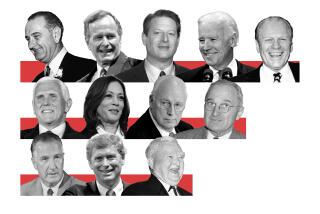New York brings out the brawler in Bernie and Hillary
- Share via
Leave it to New York City to turn a polite drawing room discussion into a street brawl. That is the sudden turn taken this week in the contest for the Democratic presidential nomination between Hillary Clinton and Bernie Sanders as it moved into the Big Apple.
Admittedly, the Democrats still have a long way to go before they lower themselves to the juvenile taunts and attacks on manhood that the Republican candidates have engaged in for months, but Sanders and Clinton are no longer on their best behavior.
The New York primary on April 19 is huge -- or “YUUUUGE,” as Sanders would say. If Clinton loses in the state she represented as a U.S. senator for eight years, serious doubts will be raised about her electoral appeal and Sanders will look like a giant killer. No wonder, then, that the Clinton campaign has reportedly decided to bring Sanders down several pegs by raising doubts about the Vermont senator’s capacity to be president.
Two days ago, Clinton appeared on MSNBC’s “Morning Joe” and said some things clearly intended to undercut her rival. Asked if Sanders — who, until he decided to run for president, identified as an independent or democratic socialist — is really a Democrat, Clinton said, “I think he himself doesn’t consider himself to be a Democrat and, you know, look, he’s raised a lot of important issues that the Democratic Party agrees with, income inequality first and foremost, but it’s up to the Democratic primary voters to make that assessment.”
More pointedly, she was asked if she considered Sanders qualified to run the country, given the stumbling answers he gave to several policy questions in a New York Daily News interview. “I think he hadn’t done his homework,” Clinton said, “and he’d been talking for more than a year about doing things that he obviously hadn’t really studied or understood, and that does raise a lot of questions.”
Getting specific, Clinton said Sanders’ inability to say precisely how he would break up big banks was concerning because “you can’t really help people if you don’t know how to do what you are campaigning on saying you want to do.”
Those comments — plus a headline in the Washington Post that erroneously suggested Clinton had literally said Sanders is unfit to be president — got Sanders’ blood boiling. During a campaign rally in Philadelphia on Wednesday night, he struck back.
“She has been saying lately that she thinks that I am, quote-unquote, not qualified to be president,” Sanders told the crowd. “Let me just say in response to Secretary Clinton, I don’t believe that she is qualified if she is, through her super PAC, taking tens of millions of dollars in special interest funds. I don’t think you are qualified if you have voted for the disastrous war in Iraq. I don’t think you are qualified if you supported the Panama free trade agreement.”
On Thursday, Clinton attempted to cools things down by laughing off Sanders’ remarks and saying she would much rather have him in the White House than Donald Trump or Ted Cruz. And maybe that will be the extent of their fight. Sanders may be satisfied having delivered a clear warning that he will punch back hard if he thinks he is being hit below the belt. For her part, Clinton may want to get back to a more friendly tone because, much as she needs a New York victory to solidify her front-runner status, she also needs to be able to win over Sanders’ supporters to find success as her party’s nominee.
That is going to be a tough sell whether she bashes Sanders or not. As a random scroll through Facebook feeds indicates, there is little politeness in the exchanges between Sanders partisans and Clinton advocates. They belittle each other, accuse each other of bullying and communicate at the level of surly Republican candidates. Clinton’s folks disdain Sanders’ youthful army as unrealistic, arrogant and unreliable. Sanders’ battalions look at Clinton and her establishment crew and see tools of Wall Street and the American war machine.
Clinton and Sanders may be able to restore a truce between themselves, but their respective fans are not likely to show such restraint. That ongoing animosity — fed by the raw, belligerent discourse on social media — may yet prove to be a big problem for whomever becomes the Democratic nominee.
More to Read
A cure for the common opinion
Get thought-provoking perspectives with our weekly newsletter.
You may occasionally receive promotional content from the Los Angeles Times.











